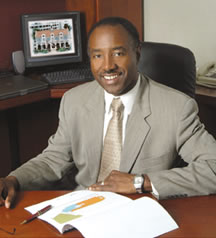New president takes the helm at UM/Jackson Memorial Medical Center
O’Quinn Hits the Ground Running
![]()
personal affinity for the mission of a major academic
medical center and the intellectual challenge of making a complex system
work drew
Marvin O’Quinn to South Florida this summer to become president
of the University of Miami/Jackson Memorial Medical Center.
 |
||
O’Quinn is spending a fair amount of his time talking with those physicians about how to improve the hospital’s systems, from the operating rooms to the average length of patient stays. He meets regularly with the clinical chairs, for example, in addition to his frequent meetings with Dean John G. Clarkson.
O’Quinn, who was previously senior vice president and chief operating officer of New York-Presbyterian Hospital, a four-campus, 2,200-bed academic medical center, has a deep appreciation for the advances that can be made in research and education at a large urban teaching hospital and how those advances can be translated directly into patient care.
The relationship between the School of Medicine and Jackson “is obviously being stressed by the environment that we are all in now,” O’Quinn says. “The fight for us is to maintain that relationship, in fact to become more integrated and more tightly related, because that is what has created the best outcome for this community.”
O’Quinn is committed to applying improvement programs to all the major systems in the hospital, “with the expectation that we will increase productivity every year.”
“The fact that we are a county institution does not give us the luxury to be poorly managed,” he says. “Quality and reasonable costs are compatible.”
It is the county’s extensive funding from the half-penny sales tax that makes it possible for Jackson to provide the highest level of care, O’Quinn says. Without that funding, Jackson would be more like a “typical county hospital, undercapitalized, with poor staffing patterns and poor medical care.”
“The combination of the UM doctors and our relation to the county makes us who we are—a system with a great reputation and a committed staff providing excellent care.”
O’Quinn was associated with Columbia and Cornell universities as chief operating officer at New York-Presbyterian Hospital, which was the result of a merger between Columbia Presbyterian Medical Center and New York Hospital-Cornell Medical Center. Before that he was associate chief operating officer and then chief operating officer of Presbyterian.
Earlier in his career O’Quinn held leadership positions at medical centers in Portland, Ore.; Fresno, Calif.; and Seattle, where he earned bachelor of arts and master of health administration degrees from the University of Washington.